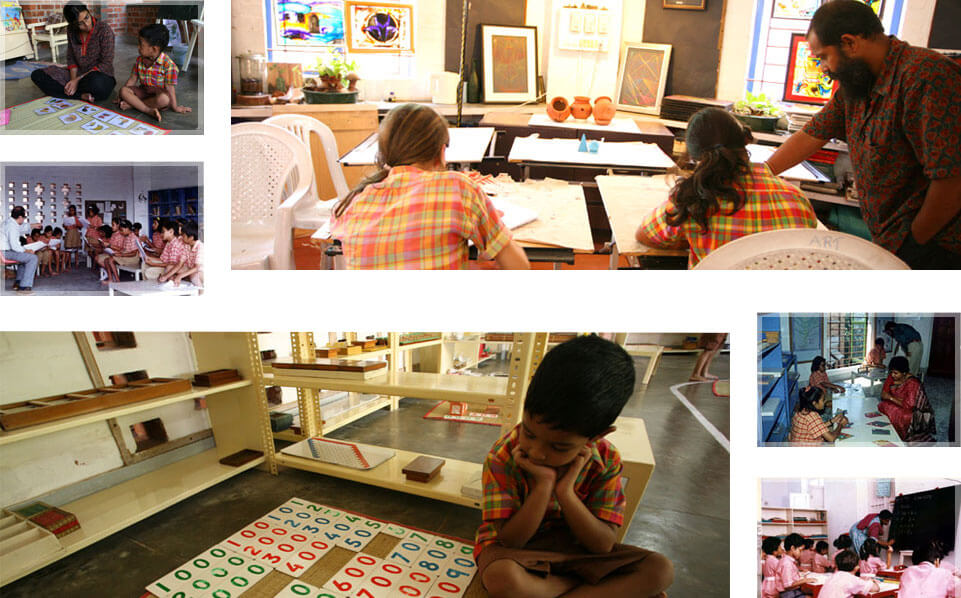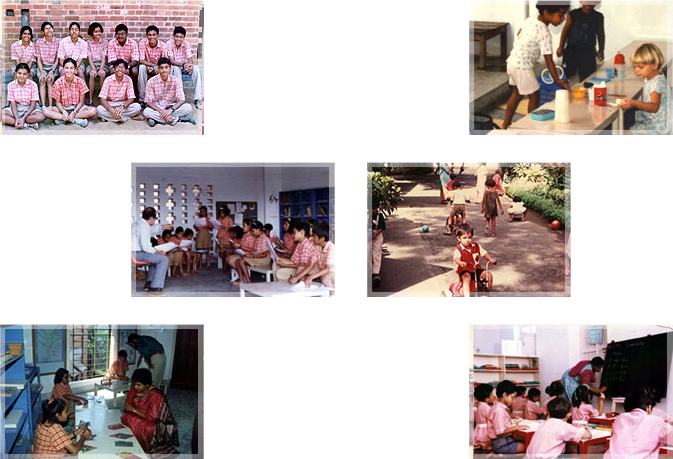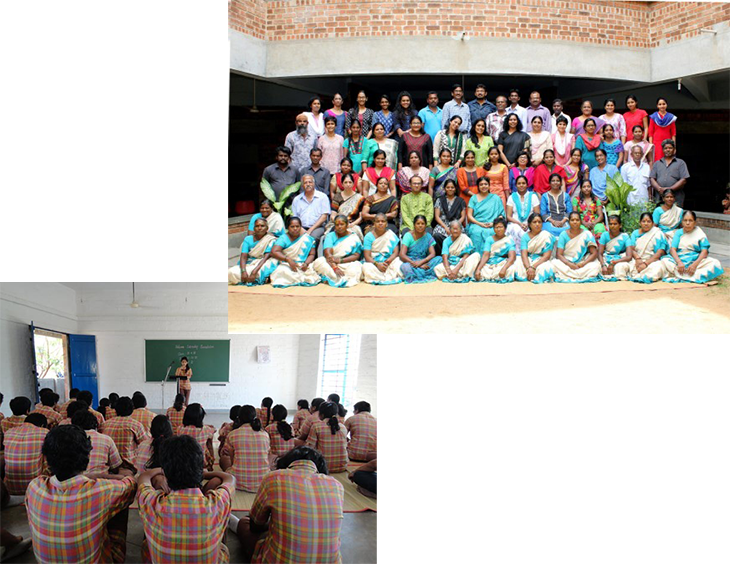History
November 19, 2023 2024-01-25 3:06History
Overview

Early Years
In the beginning Primary Montessori environments were created for the 2 1/2 to 6 age group. The children, about 30 in each class, worked in mixed age group environments with two trained adults in a class, who guided their work with Montessori materials in the areas of Exercises of Practical Life, Sensorial, Mathematics, Language and Culture. Children worked individually, choosing their work according to their plans, following the ground rules, talking softly to each other, being in charge of themselves and experiencing and arriving at their own learning.
As the children grew older, the Elementary class was designed to allow a few older children to go into a space of their own in small groups of 3 to 10 to work with the teacher at a more advanced level. Such learning was not confined to the requirements of their age or class, but guided by the children’s own needs and interests.

The school’s experience of working at the Primary level reinforced it’s understanding of Montessori philosophy, principles and methodologies. It was now felt necessary to extend the Montessori Methodology to ages 6 to 12 and beyond.
In August 1994 and July 1995 the school invited Natasia De Lange, a Montessori teacher from Holland, to look at the work being done at Abacus. Her training and experience was in the 4 to 12 age group. As a result of her visits, the school introduced mixed age groups at the Elementary level. She also helped with making Montessori materials for the higher age groups to encourage individual activity and reduce lecture-based lessons.
From this point onwards Abacus began individual activity time in mixed age groups for Elementary classes while also continuing lecture-based classes within the prescribed syllabus.
To mark 50 years of MONTESSORI IN INDIA Abacus convened, with the support of K. Sankara Menon, in Kalakshetra, Chennai, a Montessori conference, which Montessorians from across the country and other parts of the world attended. Many scholars of eminence like Dr. Mario Montessori Jr. were speakers at the convention.
Amukta Mahapatra who led the first Abacus team of teachers as Principal, resigned in 1995.

Growing Up
In January 1996, Nandita Krishnan became the principal. By June 1996 the school had reached Class 7 and became affiliated to the Council for Indian School Certificate Examinations in November 1996. Abacus was also working on setting up a permanent home. Land was acquired in Perungudi and building plans were made by Laurie Baker who showed tremendous sensitivity to the needs of the school from the Montessori viewpoint.
With the support of parents several public events were organized to raise funds for the school buildings. Between April 1995 and December 1997 two beautiful buildings came up as though they grew out of Perungudi soil.
March 2000 was a very special time as the very first batch of 9 children wrote the ICSE examinations at the end of Class 10. In February 2001 Abacus was the venue of CONFERENCE 2001, Chennai conducted by the Indian Montessori Centre, Bangalore. The Conference attracted 350 delegates from all over the country and further strengthened and spread awareness of Montessori education.
Nandita Krishnan, Principal, who saw Abacus through this intense and significant period of its growth, resigned in October 2001.
The school completes fifteen years
Zai Whitaker came on board as Principal on February 15, 2002.
In 2002 Abacus collaborated with Indian Institute for Montessori Studies, Bangalore to conduct a training course for teachers in the Montessori Method for 6-12 year olds. The course was anchored by Amukta Mahapatra for Abacus. It was attended by all the Primary and Elementary teachers at Abacus as well as 18 outside participants. The method was applied in the Elementary.
Under Zai Whitaker’s watch Abacus introduced a special education centre in 2003. A school counsellor and an ESL section were also introduced. Zai Whitaker relocated to Bangalore in April 2004 and Kamini Sundaram temporarily held the role of Principal in addition to being Director of the school.
Moving into adulthood
In September 2005 and January 2006 an all-school workshop to align the vision and goals of the school was conducted by Naresh Purushotham and M. Hariharan. The workshop was aimed at jointly articulating the beliefs and values of the school so that responsibility for the quality of the school was sustained by each and everyone, in an attempt to co-create in a non-hierarchical way. From this workshop many processes were put in place by a core team of teachers.
In September 2006 upto 2007 Brian Caszo joined as Principal. The school became an ICSE examination center. In July 2007 Vyjayanthi Bhaskar, one of the senior teachers of the school took over the post of Principal till April 2010. Abacus introduced the higher secondary program in June 2009.
Joan Elango joined Abacus as Principal from June 2010 to August 2011. The first batch of Class 12’s took the public examinations in April 2011.
June 2011 began with another all staff workshop “Reaffirming What We Stand For” that saw the school well aligned in its vision, with its systems running on well-oiled wheels.
In October 2012 Vyjayanthi Bhasker, once again, took over as Principal. In June 2013 the Biology lab was shifted to the ground floor to make space for a partitioned hall that would serve as classrooms and as a single exam hall for our children taking the ICSE and ISC exams.
Other Happenings
In October 2006 the school started STARLIGHT ABACUS, a Montessori environment for toddlers (0-3 years), which ran till April 2011.
In January 2009 Abacus played an integral role in supporting the organizing of the 26th INTERNATIONAL MONTESSORI CONGRESS at Kalakshetra conducted under the auspices of Association Montessori Internationale (AMI), Amsterdam. The Congress brought together participants from 39 Countries and many eminent speakers from India and abroad. Kamini Sundaram, member of the Board of Association Montessori Internationale (AMI), Amsterdam from April 2008 up to April 2011 was part of the formation of INDIAN MONTESSORI FOUNDATION, a pan Indian Montessori body affiliated to AMI, that works for the awareness and propagation of Montessori education and principles across India through conference, workshops and programs.
The school completes twenty-five years
Silver jubilee celebrations kicked off on October 9, 2011 with a WALKATHON from our original premises at R A Puram to the premises in Adyar and further to our present location in Perungudi; it saw students, present and former, teachers, and parents take the long walk. We had our first ALUMNI REUNION on December 22, 2011. The high point of the celebrations was a day-long carnival organized on June 18, 2012 at our Perungudi premises.
In 2012–13, the involvement of parents in the activities of the school was formalized with the PARENT INVOLVEMENT PROGRAM, as an initiative of class parent organizers. it gave parents an opportunity to work with the school by volunteering their time and talents in a variety of ways. The volunteer parents formed small teams or groups to share their interests, special skills, and things that they felt passionately about, with the children at school. They also volunteered their time to support school events. This was an opportunity for parents to build a relationship with the school team, other parents, and their children’s friends. Subsequently, alumni also took part in the activities of school.
Parents worked with the school to organize all school get-togethers. Carnivals were held on 17th February 2012 and 15th December 2013. ‘Artival’ was conducted on the 7th of February 2015. Besides food stalls and a theater performance by a professional theater group, it included a special art exhibition showcasing the works of children. Invitees could also buy some of the pieces on display.
The Student Council, comprising of student elected leaders from classes 10, 11 and 12 organized an interschool football tournament with over 150 guest players from several neighbouring and city schools coming to our campus in Perungudi to compete. This tournament has been organized by each new Student Council every year since then.
Eight of our teachers earned an international certification—Cambridge International Diploma for Teachers and Trainers (CIDTT)—through an on-campus program extending from July 2013 to February 2014 and from November 2013 to June 2014.
Moving towards an Earth Curriculum
The school followed the Montessori Method up to high school and moved into same age traditional classrooms for the 13 to 18 year olds, working towards a public school leaving certification. It was now ready to look at expanding its program, on the principles of Dr. Montessori’s recommendation for the adolescent whom she called Erdkinder, where children of this age group moved towards finding themselves close to nature. Towards this goal, 30 acres of farmland in Vellaputhur Village, Maduranthakam, was acquired in March 2014. It was called a farm-school and named SONGLINES.
An agricultural program was begun and a plan was made to integrate within it a children’s program that would follow the agricultural cycle and which would connect their lives to the land. The program began gradually, adding one class a year to the farm visits, until over several years, children in classes 7 to 9 made frequent calendared visits to the farm spending upto 45 days over 15 visits in the year. They followed organic practices in growing crops, took care of livestock, built shelters, took part in the housekeeping and cooking during their stay, harvested and sold their produce in the city school, visited the village and connected much of their learning on the farm to their classes in school.
In Jan 2018 the Indian Montessori Foundation (IMF) held its FOURTH NATIONAL MONTESSORI CONFERENCE on the 12th and 13th, at the Music Academy, Chennai. The conference, titled “Swayam—Independent Thought, Independent Action,” was well attended by families, teachers and educationists. Farm children from Abacus were invited as speakers at the conference to represent the adolescent. The children of Class 8 spoke of their farming experiences, touching the hearts of many with their sharing. A short film shared at this conference is available on YouTube under the name ABACUS FARMSCHOOL.
Gradually we came to see that such education ought to extend to all parts of the school, to children of all ages and teachers of all children. Visits to the farm, nature walks in the city campus, in parks, in surrounding areas of the city and beyond were planned and organized for Older Elementary classes, then for Younger Elementary classes and finally for Primary classes as well.
In 2019-20, a series of discussions focused on the environment were spearheaded by our parent class organizers and led to a successful waste segregation program. The culmination of the rising enthusiasm to go green was Greenival (12 January 2020), a one-day carnival on our premises that promoted products and artwork made by our children using recycled waste, besides making available organic harvests from Songlines. The entire exercise created a lasting environmental consciousness in the school community and beyond.
COVID 19
Covid 19, the coronavirus pandemic, caused a drastic disruption in the daily lives of people all over the world, from March 2020, including the closing of school campuses, forcing schools to re-invent their educational programme into a distance learning programme by taking it online. This created both challenges and opportunities. Every member of staff took part in this endeavor and the school now functions online successfully while constantly learning and adapting to changing circumstances.
The school is now in its 36th year.


